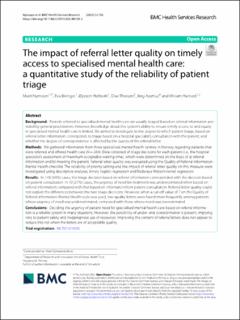| dc.contributor.author | Nymoen, Marit | |
| dc.contributor.author | Biringer, Eva Aaker | |
| dc.contributor.author | Hetlevik, Øystein | |
| dc.contributor.author | Thorsen, Olav | |
| dc.contributor.author | Assmus, Jörg | |
| dc.contributor.author | Hartveit, Miriam | |
| dc.date.accessioned | 2022-09-12T11:14:37Z | |
| dc.date.available | 2022-09-12T11:14:37Z | |
| dc.date.created | 2022-09-07T10:56:31Z | |
| dc.date.issued | 2022 | |
| dc.identifier.issn | 1472-6963 | |
| dc.identifier.uri | https://hdl.handle.net/11250/3017225 | |
| dc.description.abstract | Background
Patients referred to specialised mental health care are usually triaged based on referral information provided by general practitioners. However, knowledge about this system’s ability to ensure timely access to and equity in specialised mental health care is limited. We aimed to investigate to the degree to which patient triage, based on referral letter information, corresponds to triage based on a hospital specialist’s consultation with the patient, and whether the degree of correspondence is affected by the quality of the referral letter.
Methods
We gathered information from three specialised mental health centres in Norway regarding patients that were referred and offered health care (N = 264). Data consisted of triage decisions for each patient (i.e., the hospital specialist’s assessment of maximum acceptable waiting time), which were determined on the basis of a) referral information and b) meeting the patient. Referral letter quality was evaluated using the Quality of Referral information-Mental Health checklist. The reliability of priority setting and the impact of referral letter quality on this measure were investigated using descriptive analyses, binary logistic regression and Nadaraya-Watson kernel regression.
Results
In 143 (54%) cases, the triage decision based on referral information corresponded with the decision based on patient consultation. In 70 (27%) cases, the urgency of need for treatment was underestimated when based on referral information compared with that based on information from patient consultation. Referral letter quality could not explain the differences between the two triage decisions. However, when a cut-off value of 7 on the Quality of Referral information-Mental Health scale was used, low-quality letters were found more frequently among patients whose urgency of need was underestimated, compared with those whose need was overestimated.
Conclusions
Deciding the urgency of patient need for specialised mental health care based on referral information is a reliable system in many situations. However, the possibility of under- and overestimation is present, implying risks to patient safety and inappropriate use of resources. Improving the content of referral letters does not appear to reduce this risk when the letters are of acceptable quality. | en_US |
| dc.language.iso | eng | en_US |
| dc.publisher | BMC | en_US |
| dc.rights | Navngivelse 4.0 Internasjonal | * |
| dc.rights.uri | http://creativecommons.org/licenses/by/4.0/deed.no | * |
| dc.title | The impact of referral letter quality on timely access to specialised mental health care: a quantitative study of the reliability of patient triage | en_US |
| dc.type | Journal article | en_US |
| dc.type | Peer reviewed | en_US |
| dc.description.version | publishedVersion | en_US |
| dc.rights.holder | Copyright 2022 The Author(s) | en_US |
| dc.source.articlenumber | 735 | en_US |
| cristin.ispublished | true | |
| cristin.fulltext | original | |
| cristin.qualitycode | 2 | |
| dc.identifier.doi | 10.1186/s12913-022-08139-3 | |
| dc.identifier.cristin | 2049405 | |
| dc.source.journal | BMC Health Services Research | en_US |
| dc.identifier.citation | BMC Health Services Research. 2022, 22 (1), . | en_US |
| dc.source.volume | 22 | en_US |
| dc.source.issue | 1 | en_US |

